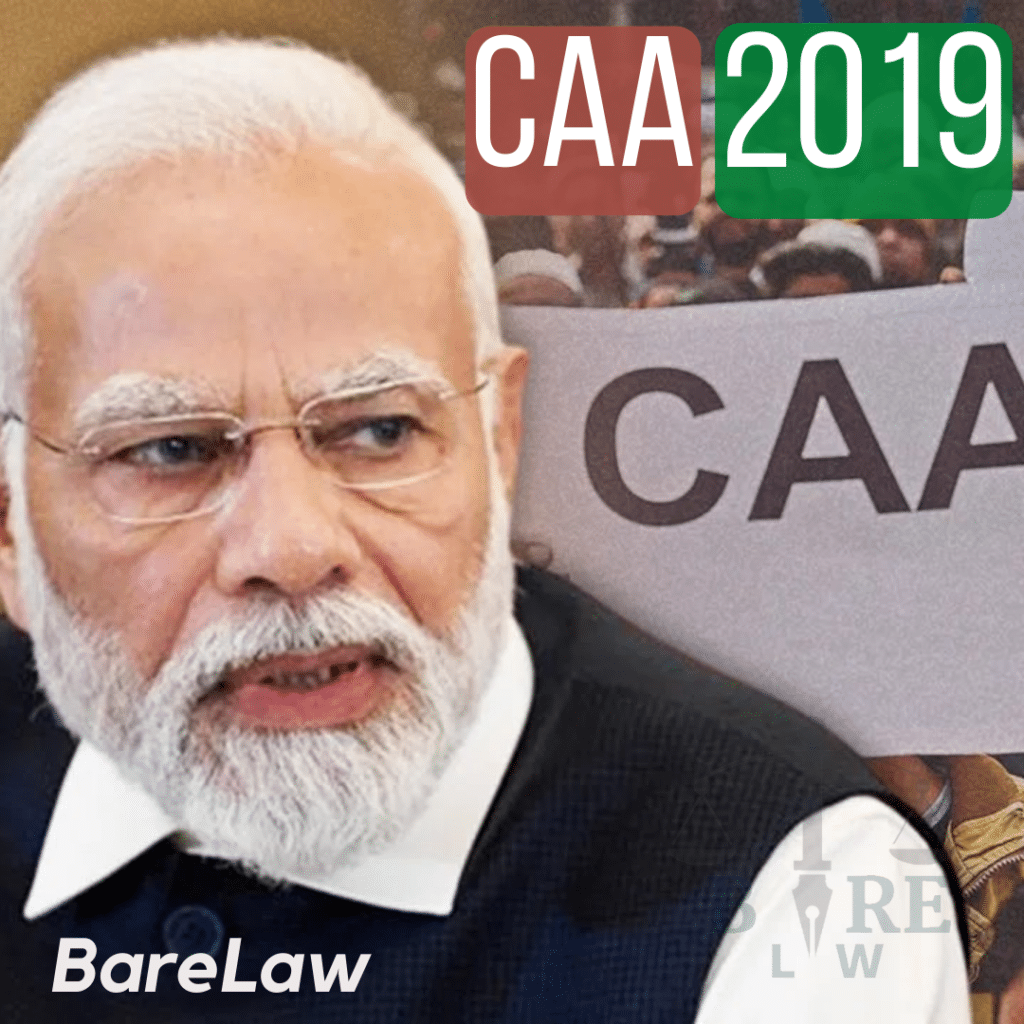
Citizenship (Amendment) Act, 2019
Authored By: Harpreet Kaur
Amendment
The Citizenship (Amendment) Act, 2019 (CAA) introduces several important features which can be explained in detail below.
- Amendments to the Citizenship Act (1955): The CAA is amending the existing Citizenship Act 1955 for specific provisions of citizenship. Granting of citizenship to certain religious minorities from Pakistan, Afghanistan and Bangladesh
- Eligibility Criteria: This law sets out the criteria that must be met by persons who want to become citizens under it. This program is open to migrants belonging to any of these six religions mentioned above – Hindus, Sikhs, Buddhists, Jains, Parsis and Christians coming to India from Pakistan, Afghanistan or Bangladesh on or before December 31, 2014. It is applicable.
- Immunity from legal process: The CAA protects members of these religious minorities from being prosecuted if they enter India without proper documents or stay in the country after their visa has expired. Specifically this exemption is meant to simplify procedures for those fleeing religious persecution in obtaining Indian citizenship.
- Residency Requirements: While certain religious minorities are eligible under this law there are also residency requirements. Any person applying for CAA citizenship must have resided in India for a certain length of time preceding their application. Although not defined under the law; rules and regulations will determine it.
- Fast-track citizenship: Under CAA eligible persons receive expedited process towards acquiring Indian citizenship. It is however not normal naturalization and only meant for those who meet the legal standards but would prefer a quicker path to becoming Indians than would otherwise be available.
- Exclusion of Muslims: Arguably one of the most contentious parts of the CAA is that it does not include Muslims as beneficiaries. Detractors claim that such an approach based on religion instead constitutes secularism against which discrimination toward Muslims violates principles enshrined in its constitution
- Debate and controversy: There were numerous controversies surrounding CAA across India resulting into protests. Critics feared that India’s secular fabric would be damaged and Muslims alienated. They claim it offers the much-needed protection for religious minorities; saying they have been persecuted by neighboring countries.
Key Provisions of Amendment Bill
The Bill provides that Hindus, Sikhs, Buddhists, Jains, Parsis and Christians from Afghanistan, Bangladesh and Pakistan who entered India on or before December 31, 2014, This is to amend the law so that they are not treated as illegal immigrants.
- A waiver has also been given by the Central Government under which a person can claim this benefit provided they are not foreigners within the meaning of Section 2(a) of the Foreigners Act 1946 or aliens within the meaning of clauses (b), (c) and (d) of Article 5 of the Constitution.
- While carrying passport is one among the requirements stipulated in Act No. XXXI of 1920 for any foreigner admitted into India and out of it by land sea or air other than Nepal citizens, Act No. LXXII controls foreigners’ admission into or exit from our country as well as their stay here.
Citizenship by Registration or Naturalization
The law allows individuals to apply for citizenship by registration or naturalization if they meet certain requirements.
For example, if she has lived in India for a year and one of her parents is a former Indian citizen, she can apply for citizenship through registration.
- To obtain citizenship through naturalization, a person must be resident in India or she must have served in the Central Government for at least 11 years before applying for citizenship.
- This bill provides an exception to this status for Hindus, Sikhs, Buddhists, Jains, Parsis, and Christians in Afghanistan, Bangladesh, and Pakistan. For these groups of people, the 11 year requirement is reduced to her 5 years.
- Upon acquisition of citizenship,
- (i) the person shall be deemed to be a citizen of India from the date of his entry into India and
- (ii) all legal proceedings against him in connection with illegal immigration or citizenship shall be terminated.
Applicability of Amendment Act
- These provisions regarding citizenship of illegal immigrants are not applicable to the tribal areas of Assam, Meghalaya, Mizoram and Tripura, which are included in the Sixth Schedule of the Constitution. These tribal areas include KarbiAnglong (Assam), Garo Hills (Meghalaya), Chakma district (Mizoram) and Tripura tribal regional districts.
- Further, it does not apply to the ‘Inner Line’ areas notified under the Bengal Eastern Frontier Regulations, 1873. In these areas, visits by Indians are regulated by Inner Line Permits.
- Currently, this permit system is applicable to Arunachal Pradesh, Mizoram and Nagaland. Manipur was also brought under the Inner Line Permit (ILP) regime through a gazette notification on the same day the bill was passed in Parliament.
Cancellation of Registration of OCI
The Act provides that the Central Government may cancel the registration of OCI on certain grounds. These include:
- in case if OCI was registered by fraud; or
- the individual has been sentenced for more than two years within his five years of registration as an OCI; or
- and if it is registered by fraud because this is required for India’s security and sovereignty sake consider.
This bill adds another ground for revocation of registration. That is if the OCI violates the provisions of the Act or any other law notified by the Central Government. An order revoking an OCI should only be issued after the OCI cardholder has been given an opportunity to be heard.
Concerns about Amendment Act
Issues in the Northeast
This goes contrary to what Assam Accord envisaged in 1985. It stated that deportation would take its course against every illegal immigrant who came from Bangladesh after March 25, 1971 regardless of their faith. Masu. 4,444 There are fears as well that the amended law will stymie massive updates of the National Register of Citizens (NRC).
Assam is home to an estimated 20 million illegal Bangladeshi immigrants, who not only place a heavy burden on the state’s resources and economy, but also necessarily change the state’s demographics.
Conclusion: Currently, the responsibility is to interpret the provisions of the Act, consider their constitutionality, and determine whether the “classifications” made in the Act are “appropriate’’ when considered under Article 14. the Supreme Court as the guardian of the Constitution.
India has a civilized duty to protect those facing prosecution in its neighbourhood. However, the method must be consistent with the spirit of the Constitution.





